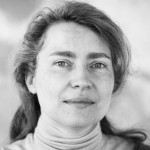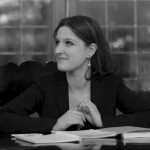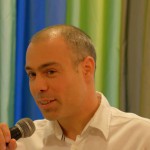CEFRES Platform Workshop for Young Scholars
Deadline for Submission: 29 February 2016.
Decision notification due: 14 March 2016.
Date & Place: 12 May 2016, at CEFRES on Národní 18, conference room on the 7th floor.
Organizers: Jana Vargovčíková (CEFRES & FF UK) and Kateřina Merklová (FF UK)
Please send your CV, paper title and a 500 words-long abstract to: jana.vargovcikova@cefres.cz.
The workshop will include among its discussants Hélène Michel (SAGE, Institut d´Études Politiques in Strasbourg) and Michael Smith (CERGE-EI, Czech Academy of Sciences).
For non-Czech participants, accommodation in Prague can be provided by the organizers.
Call for Papers
Political activities of private actors have long since been an object of study in many disciplines of social sciences. In political science and sociology, the notion of “interest group” has served as a particular way of conceptualizing private actors when they try to influence public decision-making (Courty 2006; Grossman and Saurugger 2006). In the face of a growing diversity of entities undertaking such activities (e.g. individual companies, their associations, think-tanks, hybrid networks of companies and NGOs), some suggested that the definition of the term should be extended to encompass this variety of actors (Gray and Lowery 1996; Saurugger 2004) while others have highlighted the specificities of the role companies (Mclaughlin, Jordan, and Maloney 1993; Coen 1997; Hart 2008; Ciepley 2013; Landemore and Ferreras 2015) or lobbyists (Heinz et al. 1993; Kersh 2002; Michel 2005; Courty and Michel 2012) play as actors in politics. The distinction between the private and the public spheres, however, remains a common analytical ground to these works, even when they conclude by observing how the two interlock.
The interweaving relationships of public and private actors have been studied and theorized at least since the works of Arthur Bentley and later pluralist and neo-corporatist theories of state-society relationships (Truman 1959; Schattschneider 1960; Schmitter 1974), theories pointing to rent-seeking behaviour of private actors (Tullock 2005) as well as studies of transnational politics emphasizing the role of private actors in it (Mansbach and etc 1976). In recent decades however, a body of literature has emerged that documents a growth in private actors’ involvement in politics and policy at multiple levels of government, which it relates to the changes in modes of governance towards more horizontality and flexibility in creating policy-making fora (Rhodes 1997; Héritier 2002; Hall and Biersteker 2002; Stone 2013; Peters 2009), but also to the state’s changing regulatory modes and capacities (Majone 1994; Lascoumes and Le Galès 2004; Lascoumes and Le Galès 2007).
While some contend these developments testify to a “retreat of the state” (Strange 1996) or “hollowing out of the state” (Rhodes 1994), others consider that when outsourcing parts of their responsibilities, states are indeed keeping control over the process, and remain, in fine, agents of authority delegation and “accomplices” of the growing role of private actors (Wright 1994; Knill and Lehmkuhl 2002; Green 2013). Still, this rising part taken by private actors in politics and policy has to be read in the context of what has come to be labelled as a crisis of representation. As public authorities are striving to ground more firmly their legitimacy, they are opening windows of opportunity for actors still deprived of a formalized role in politics to negotiate their place in the public sphere.
As the dichotomy underpinning most of this literature suggests, when private actors develop activities in order to influence the production of norms, they can be seen as transgressing borders between the private and the public sphere.
Our workshop will focus on the management, the implications, and the meanings of such transgressions, both analytical and normative:
(1) since norm-production and oversight have been key elements of the classical distinction between the public and private spheres at least from the formation of modern state, the very foundations of such distinction may be questioned with private actors’ increasing involvement in public decision-making.
(2) the analytical distinction, however, cannot entirely be separated from a normative one, the private actors’ involvement sometimes leading to a transgression of norms of democratic decision-making founded on publicity, legitimacy, equality and accountability.
The ambivalence in the perceptions of their role also seems to be growing sharper: On the one hand, private actors are increasingly providing not only technical, but also legal and legislative expertise, be it via expert groups or through the outsourcing of legal work by parties and administrations. They are labelled as partners of public authorities in the Public-Private Partnership projects, as collaborators (Donahue and Zeckhauser 2006), stakeholders or become entrepreneurs of norm-creation themselves (Green 2013). In reaction to broader pressures for companies to take responsibility over their impacts on society and the environment, CSR strategies have become a common exercise for large firms. Growing out of the CSR concept, the notion of corporate citizenship appeared in managerial literature and debates on the purpose of multinational firms, and initiated claims of rights based on these new ways of legitimation (Champion and Gendron 2005; Gendron 2014).
On the other hand, accounts multiplied of private actors’ involvement in financing political parties, of their seeking public procurement contracts through practices of clientelism or corruption, and of their growing investments in lobbying. After decades of reluctance, the criminal liability of companies has entered criminal codes of most European countries: today, companies, and not only “deviant” individuals working for them, can be accountable for white-collar crime (Lascoumes, 1997). Correspondingly, the “fight against corruption” has been institutionalized at both transnational and national levels (Favarel-Garrigues 2009). As contextual as perceptions of corruption might be (Heidenheimer and Johnston 2001; Lascoumes 2011), countless scandals and affairs related to corruption (Thompson 2000; Offenstadt et al. 2007; Rayner 2007; Blic and Lemieux 2005) have stirred public indignation in the recent decades.
Our workshop will bring together junior researchers (advanced PhD students and post-docs in political science, law, sociology and economics) who seek to address the changing role of private actors in norm-production. We particularly welcome papers, empirical or theoretical, related to Central and Eastern European contexts.
Areas of interest include but are not limited to the following:
1. How do private actors manage these transgressions both internally (vis-à-vis their shareholders and employees), and externally (public communication, interactions with public actors)? How do they adapt their practices to the rules of the public sphere? How in turn do they transform these very rules?
2. What role do intermediaries such as consultants, lobbyists, lawyers or advisors play in managing the transgressions between the private and public spheres, both as analytical and as normative categories?
3. How do various public actors manage private actors’ transgressions in the political sphere?
4. What does the growing involvement of private actors in politics and policy mean for the very dichotomy of the public and private spheres and the associated dichotomy of public and private actors? How can we grasp the impact of such developments on our understanding of democratic governance?
Scientific Committee
Hélène Michel (SAGE, Institut d´Études Politiques in Strasbourg), Michael Smith (CERGE-EI, Czech Academy of Sciences), Zdeňka Mansfeldová (Institute of Sociology, Czech Adacemy of Sciences), Ondřej Císař (Institute of Sociology, Czech Adacemy of Sciences), Ondřej Slačálek (Department of Political Science, Faculty of Arts, Charles University in Prague).
References
Blic, Damien de, and Cyril Lemieux. “Le scandale comme épreuve.” Politix 71, no. 3 (September 1, 2005): 9– 38.
Champion, Emmanuelle, and Corinne Gendron. “De la responsabilité sociale à la citoyenneté corporative: L’entreprise privée et sa nécessaire quête de légitimité.” Nouvelles pratiques sociales 18, no. 1 (2005).
Ciepley, David. “Beyond Public and Private: Toward a Political Theory of the Corporation.” American Political Science Review 107, no. 1 (February 2013): 139–58.
Coen, David. “The Evolution of the Large Firm as a Political Actor in the European Union.” Journal of European Public Policy 4, no. 1 (January 1, 1997): 91–108.
Courty, Guillaume. Les groupes d’intérêt. Paris: La Découverte, 2006.
Courty, Guillaume, and Hélène Michel. “Groupes D’intérêt et Lobbyistes Dans L’espace Politique Européen : Des Permanents de L’eurocratie.” In Le Champ de l’Eurocratie. Une Sociologie Politique Du Personnel de l’UE, edited by Didier Georgakakis, Etudes politiques., 213–40. Paris: Economica, 2012.
Donahue, John D., and Richard J. Zeckhauser. “Public-Private Collaboration.” In The Oxford Handbook of Public Policy, edited by Michael Moran, Martin Rein, and Robert E. Goodin, 496–525. New York: Oxford University Press, 2006.
Favarel-Garrigues, Gilles. “Présentation.” Droit et société n° 72, no. 2 (September 29, 2009): 273–84.
Gendron, Corinne. “L’entreprise Citoyenne Comme Utopie Économique : Vers Une Redéfinition de La Démocratie ?” Lien Social et Politiques, no. 72 (2014).
Gray, Virginia, and David Lowery. The Population Ecology of Interest Representation: Lobbying Communities in the American States. Ann Arbor: University of Michigan Press, 1996.
Green, Jessica F. Rethinking Private Authority: Agents and Entrepreneurs in Global Environmental Governance. Princeton: Princeton University Press, 2013.
Grossman, Emiliano, and Sabine Saurugger. Les Groupes D’intérêt : Action Collective et Stratégies de Représentation. Armand Colin, 2006.
Hall, Rodney Bruce, and Thomas J. Biersteker. The Emergence of Private Authority in Global Governance. Cambridge University Press, 2002.
Hart, David M. “The Political Theory of the Firm.” SSRN Scholarly Paper. Rochester, NY: Social Science Research Network, December 31, 2008. http://papers.ssrn.com/abstract=1406640.
Heidenheimer, Arnold J., and Michael Johnston, eds. Political Corruption: Concepts and Contexts. 3rd edition. New Brunswick, N.J: Transaction Publishers, 2001.
Heinz, John P., Edward O. Laumann, Robert L. Nelson, and Robert H. Salisbury. The Hollow Core: Private Interests in National Policy Making. Cambridge, Mass: Harvard University Press, 1993.
Héritier, Adrienne. “New Modes of Governance in Europe: Policy Making without Legislating?” In Reihe Politikwissenschaft, Vol. 81. Wien: Institut für Höhere Studien (IHS), Wien, 2002.
Kersh, Rogan. “Corporate Lobbyists as Political Actors: A View from the Field.” In Interest Group Politics, 225–48. Washington: CQ Press, 2002.
Knill, Christoph, and Dirk Lehmkuhl. “Private Actors and the State: Internationalization and Changing Patterns of Governance.” Governance 15, no. 1 (January 1, 2002): 41–63.
Landemore, Hélène, and Isabelle Ferreras. “In Defense of Workplace Democracy Towards a Justification of the Firm–State Analogy.” Political Theory, September 18, 2015.
Lascoumes, Pierre. Élites irrégulières: Essai sur la délinquance d’affaires. Paris: Gallimard, 1997.
———. Une démocratie corruptible : Arrangements, favoritisme et conflits d’intérêts. Paris: Seuil, 2011.
Lascoumes, Pierre, and Patrick Le Galès. Gouverner par les instruments. Presses de la Fondation nationale des sciences politiques, 2004.
———. “Introduction: Understanding Public Policy through Its Instruments—From the Nature of Instruments to the Sociology of Public Policy Instrumentation.” Governance 20, no. 1 (January 1, 2007): 1–21.
Majone, Giandomenico. “The Rise of the Regulatory State in Europe.” West European Politics 17, no. 3 (July 1, 1994): 77–101.
Mansbach, Richard W., and etc. Web of World Politics: Non-State Actors in the Global System. Englewood Cliffs, N.J.: Prentice Hall, 1976.
Mclaughlin, Andrew m., Grant Jordan, and William A. Maloney. “Corporate Lobbying in the European Community.” JCMS: Journal of Common Market Studies 31, no. 2 (June 1, 1993): 191–212.
Michel, Hélène, ed. Lobbyistes et lobbying de l’Union européenne : Trajectoires, formations et pratiques des représentants d’intérêts. Strasbourg: Presses universitaires de Strasbourg, 2005.
Offenstadt, Nicolas, Luc Boltanski, Elisabeth Claverie, and Stéphane Van Damme. Affaires, scandales et grandes causes : De Socrate à Pinochet. Paris: Stock, 2007.
Peters, Anne. Non-State Actors as Standard Setters. Cambridge University Press, 2009.
Rayner, Hervé. Dynamique du scandale : De l’affaire Dreyfus à Clearstream. Paris: Editions Le Cavalier Bleu, 2007.
Rhodes, R. A. W. “The Hollowing Out of the State: The Changing Nature of the Public Service in Britain.” The Political Quarterly 65, no. 2 (April 1, 1994): 138–51.
Rhodes, R. A. W. Understanding Governance: Policy Networks, Governance, Reflexivity, and Accountability. Buckingham; Philadelphia: Open University Press, 1997.
Saurugger, Sabine. Européaniser les intérêts. Les groupes d’intérêts économiques et l’élargissement de l’Union européenne. Paris: L’Harmattan, 2004.
Schattschneider, Elmer Eric. The Semisovereign People: A Realist’s View of Democracy in America. Holt, Rinehart and Winston, 1960.
Schmitter, Philippe C. “Still the Century of Corporatism?” The Review of Politics 36, no. 1 (January 1, 1974): 85–131.
Stone, Diane. Knowledge Actors and Transnational Governance: The Private-Public Policy Nexus in the Global Agora. [S.l.]: Palgrave Macmillan, 2013.
Strange, Susan. The Retreat of the State: The Diffusion of Power in the World Economy. 1st edition. New York: Cambridge University Press, 1996.
Thompson, John B. Political Scandal: Power and Visibility in the Media Age. 1 edition. Cambridge : Malden, MA: Polity, 2000.
Truman, David Bicknell. The Governmental Process: Political Interests and Public Opinion. A. Knopf, 1959.
Tullock, Gordon. The Rent-Seeking Society. The Selected Works of Gordon Tullock, v. 5. Indianapolis: Liberty Fund, 2005.
Wright, Vincent. “Reshaping the State: The Implications for Public Administration.” West European Politics 17, no. 3 (July 1, 1994): 102–37.
 My research focuses on Eastern Bohemia from the 1870s to the 1940s. Despite its fringe position at the Silesian border, between the Elbe and Moravia, this territory developed the most modern textile industry within the Double Monarchy and fully integrated the circuits of global exchanges of the end of 19th century. At the same time, Eastern Bohemia’s society experienced violent clashes between its Czech- and German-speaking populations. The expulsions of Germans in 1945-1946 put an end to a period tainted with globalization, democratization and nationalist drifts.
My research focuses on Eastern Bohemia from the 1870s to the 1940s. Despite its fringe position at the Silesian border, between the Elbe and Moravia, this territory developed the most modern textile industry within the Double Monarchy and fully integrated the circuits of global exchanges of the end of 19th century. At the same time, Eastern Bohemia’s society experienced violent clashes between its Czech- and German-speaking populations. The expulsions of Germans in 1945-1946 put an end to a period tainted with globalization, democratization and nationalist drifts.


